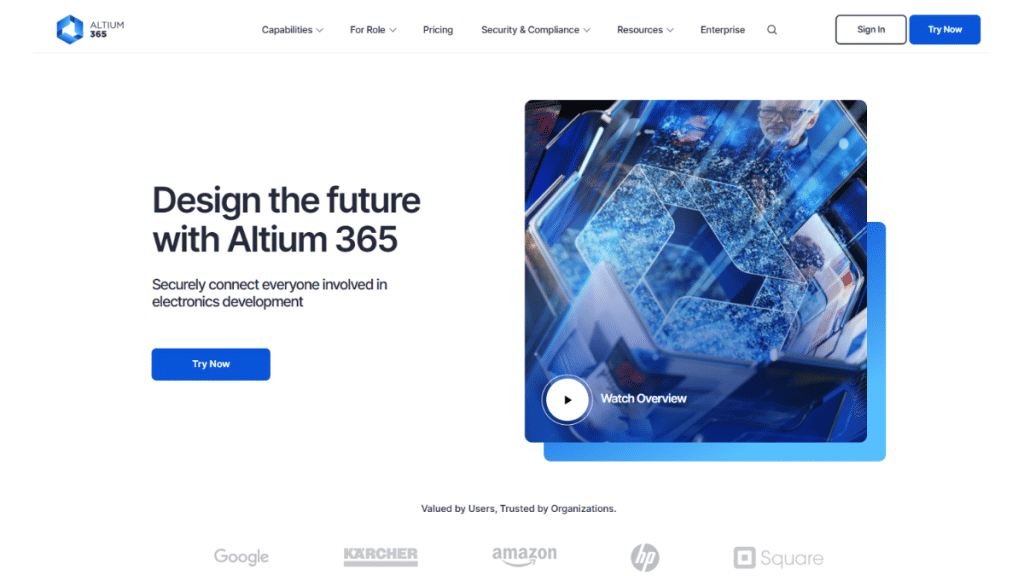Altium 365 is a state-of-the-art cloud-based platform that revolutionizes electronics development by unifying design, collaboration, and supply chain management into a single cohesive environment. By integrating real-time data synchronization, robust security measures, and advanced collaborative tools, Altium 365 empowers engineering teams to streamline workflows and accelerate product innovation.
This holistic approach not only reduces errors and design iterations but also ensures regulatory compliance and data integrity throughout the entire lifecycle of electronic product development. Whether it’s optimizing design reviews, managing component libraries, or facilitating rapid prototyping, Altium 365 stands as a pivotal tool in driving efficiency and competitive advantage in today’s fast-paced electronics industry.
What Is Altium 365?
Altium 365 is a cloud-based, unified platform that transforms the entire electronics development lifecycle—from design and collaboration to manufacturing and supply chain management. It integrates advanced tools and real-time data synchronization to streamline workflows, reduce errors, and safeguard intellectual property.
Unified Design Environment
Integrated Ecosystem
- Centralized Data Management: Altium 365 merges electronic design (ECAD), BOM (Bill of Materials) management, and supply chain analytics into one cohesive environment. This integration eliminates departmental silos between design, procurement, and manufacturing teams, ensuring everyone accesses the same up-to-date information.
- Real-Time Data Synchronization: Updates to design files, component libraries, and supplier data are propagated immediately across the platform. This minimizes the risk of using outdated information and reduces design iteration cycles.
Enhanced Collaboration
- Unified Workspace: A single platform allows engineers, procurement specialists, and manufacturing teams to collaborate in real time, facilitating smoother transitions between project phases.
- Transparency and Accountability: Centralized data and version control ensure that every change is logged, making audits and traceability straightforward.
Real-Time Collaboration Tools
Dynamic Design Reviews
- Integrated Feedback Systems: Built-in tools enable teams to annotate designs, track comments, and discuss changes in real time. When integrated with project management tools like Jira, task assignments and issue tracking are automatically synchronized.
- Bidirectional Synchronization: Any update—whether from design modifications or task completions—is reflected across all integrated platforms, ensuring consistency and reducing potential rework.
Version Control and Audit Trails
- Comprehensive Change Management: Detailed version histories track every modification, allowing teams to revert changes if necessary and maintain a robust audit trail for quality control and compliance.
Advanced Security Architecture
Data Protection
- Encryption Standards: The platform uses AES-256 encryption for data at rest and TLS 1.2 or higher for data in transit. This ensures that sensitive design files and proprietary information remain secure against unauthorized access.
- Robust Access Controls: With role-based permissions, multi-factor authentication (MFA), IP whitelisting, and Single Sign-On (SSO), Altium 365 ensures that only authorized users can access specific resources.
Compliance and Government-Grade Security
- GovCloud Deployment: For projects requiring stringent regulatory adherence (such as those governed by ITAR and EAR), a dedicated AWS GovCloud region is available. This setup meets rigorous US government security standards and offers isolated infrastructure for sensitive projects .
Supply Chain Integration
Live Supplier Data
- Up-to-Date Component Information: Real-time supplier feeds provide essential data on component pricing, availability, lifecycle status, and regulatory compliance (e.g., RoHS, REACH). This helps design teams avoid obsolete parts and procurement delays.
- Streamlined Procurement: By integrating multiple BOM sources into a consolidated document via the BOM Portal, procurement teams can efficiently compare and order components, reducing lead times and enhancing supply chain transparency.
Component Lifecycle Management
- Proactive Alerts: The managed component library tracks part usage across projects, notifying teams when components approach end-of-life or become obsolete, thereby enabling timely design adjustments.
Applications and Use Cases
Design Validation and Compliance
- Cross-Probing Between Views: The platform’s ability to cross-reference 2D/3D board views with BOM data ensures accurate component placement and design integrity.
- Automated Compliance Checks: Integrated tools automatically verify that designs meet regulatory standards, flagging non-compliant components and suggesting alternatives.
Prototyping and Assembly
- Assembly Assistant: This browser-based tool combines interactive 2D/3D board views with BOM data to aid assembly teams. It allows users to mark components as “Done” or “Skipped” and maintains audit trails, ensuring the assembly process is both efficient and traceable.
- Enhanced Workflow Efficiency: Keyboard shortcuts and task management features help streamline assembly operations, speeding up prototyping and short-run production processes.
Knowledge Sharing and Training
- Guided Tutorials and Documentation: Detailed onboarding workflows and technical guides reduce the learning curve, ensuring that teams can quickly adopt and fully leverage the platform’s capabilities.
Market Impact and Future Outlook
Competitive Advantage
- Reduced Redesign and Time-to-Market: By catching design issues early and ensuring data integrity across the development process, Altium 365 minimizes costly redesigns and shortens the product development cycle.
- Cost Efficiency: Streamlined workflows and improved component management result in significant time and cost savings, making it an attractive solution for both startups and large enterprises.
Driving Industry Transformation
- Digital Transformation in Electronics: The shift toward cloud-based, collaborative platforms is revolutionizing how electronic products are developed. Altium 365 is at the forefront of this trend, driving efficiency improvements and fostering innovation throughout the electronics ecosystem.
Conclusion
Altium 365 redefines electronics development by offering a fully integrated, cloud-native platform that brings together design, collaboration, and supply chain management. Its robust security protocols, real-time collaboration tools, and comprehensive data management capabilities empower teams to deliver high-quality products faster and more securely. As the industry increasingly embraces digital transformation, Altium 365 is well positioned to continue shaping the future of electronics design and manufacturing.
